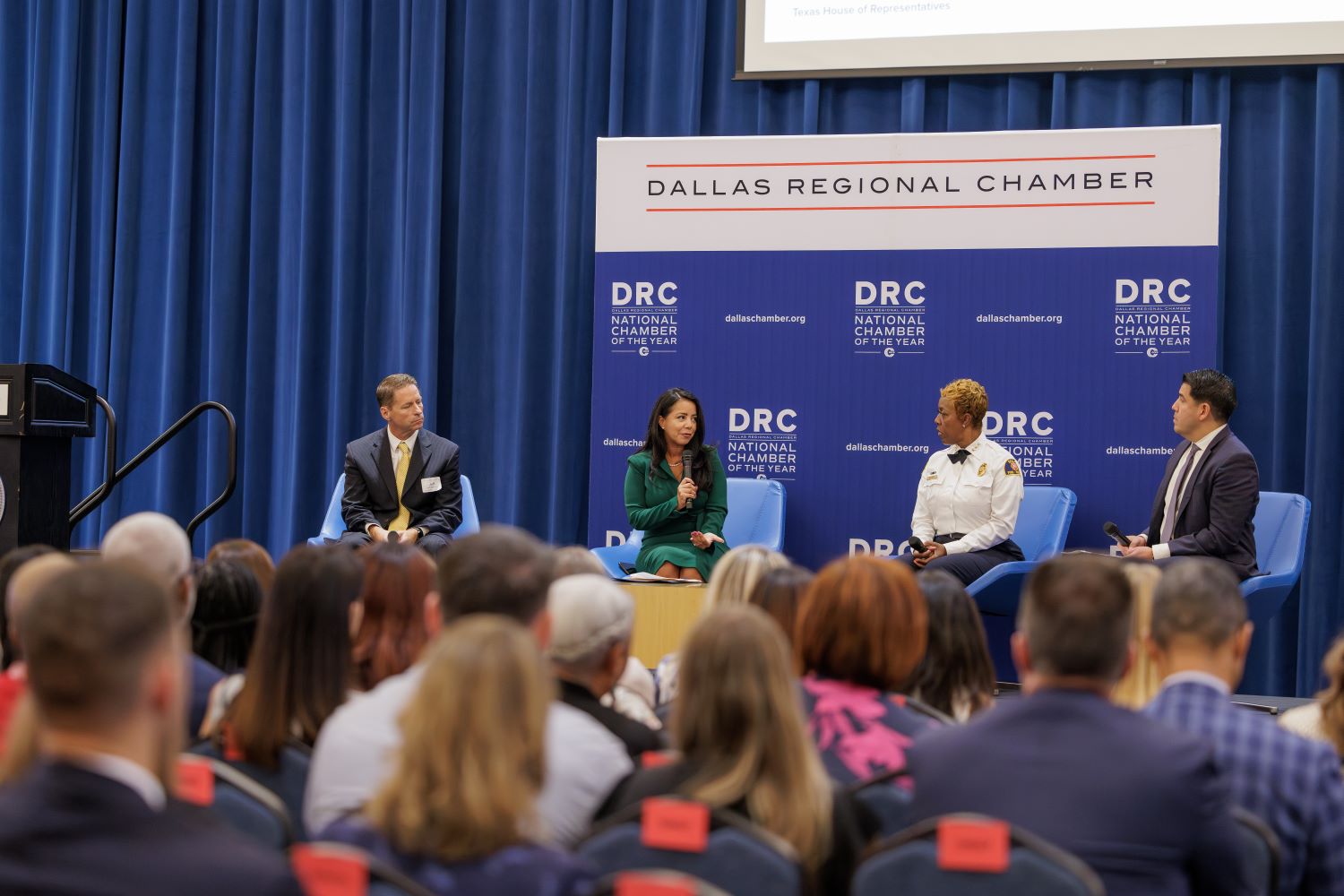By Catie George, Manager, Communications and Storytelling
The Dallas Regional Chamber (DRC) hosted the second annual State of Public Safety, sponsored by Texas Instruments, Thursday, Aug. 31, at the University of North Texas (UNT) at Dallas. The signature DRC event featured public officials, safety experts, and legislative representatives in conversation about their commitment to public safety to support continued prosperity for the Dallas Region.
“We believe companies are only as strong as the communities in which they operate, and one of the most important tenets to every strong community is a fair, transparent, and trusted public safety system,” said Rafael Lizardi, 2023 DRC Board Chair and Chief Financial Officer of Texas Instruments, to kick off the event. “We also believe that the business community has a shared responsibility to make our region a safe place to live and work for everyone. That starts with conversations like the ones we’ll be having today with law enforcement, first responders, and academic and public policy experts.”

The first panel discussion between UNT Dallas President Bob Mong and Dallas Police Chief Eddie Garcia highlighted the new Regional Law Enforcement Training Center, which will be built at UNT Dallas and serve as a regional training facility.
“The fact that it’s a regional facility, to be able to assist other agencies, is something that will be a shot in the arm not just for the city of Dallas, but for the whole area,” said Garcia. “Our communities don’t want us to go away. They want us to be better as a profession, there’s no question about it. But we have to hold ourselves accountable as a department. And we do that.”
Funding for the training center was a priority for the DRC during the 88th Texas Legislative Session. Advocacy efforts ultimately helped secure $20 million in funding for the facility, which will replace Dallas’ outdated police training academy. The current academy was billed as a temporary solution when it opened in 1990 and has not been renovated since.
President Mong also anticipates the new facility to be successful because of UNT Dallas’ approach to collaboration throughout the region.
“I look at us as a work in progress, which is a good thing. We’re not steeped in ‘this is the way we’ve always done things.’ We’re very collaborative,” said Mong. “I’m happy to say that while criminal justice enrollment around the country is spotty, it’s up and down, ours has been growing.”
Chief Garcia also revealed that contrary to national statistics, violent crime is down in Dallas. Garcia attributes this to a data-driven policing approach, as well as consistent support from the Dallas mayor, city council, and city manager.
With several retail companies in the room, Chief Garcia addressed the Dallas Police Department’s approach to managing the “epidemic” of organized retail theft.
“We’ve dedicated two detectives from our financial crimes unit to be involved. Intelligence gathering is key,” Garcia said, adding that this issue being widespread offers the opportunity to compare mitigation strategies with national and other local law enforcement entities.
The second panel featured Texas Representative Victoria Neave Criado, Assistant Dallas Fire Chief Tameji Berry, and Executive Director of the Caruth Institute Jeff Spivey. They kicked off the panel with a nod to the DRC.
“The Dallas Regional Chamber has been a strong partner in our bipartisan Dallas area legislative delegation,” said Criado. “We really appreciate it whenever y’all come down to the Capitol and talk to us about issues that are important to you. I think this partnership has been helpful as we move forward legislation that impacts our entire region.”

One piece of legislation the panel discussed in detail was a bill that opens the pool of applicants to the Dallas Police Department to allow legal permanent residents to apply in hopes of addressing the staffing shortage in law enforcement.
“The recruitment and retention of police officers is a national issue that no one has an easy answer for. However, just because we have a vacancy in an organization, just because we need a rear end in that seat, doesn’t mean we should lower our standards,” said Berry. “And this legislation really set forth some standards so that the men and women in these communities know the police officers we’re hiring are the best and the brightest… And just as with the legislation, it’s not lowering the bar, it’s just doing something a little bit different.”
Knowing the sacrifice police officers and firefighters consistently make, the audience was curious how to best support them and get involved in public safety.
“I would encourage you, from a business standpoint, to encourage your employees to really understand the inner workings of public safety, not just what they read or see on social media or in the mass media, but really being involved,” said Spivey.
“I think that if the business community continues to advocate for mental health for the entire infrastructure, that would be a great start,” Berry added. “And then look at what it is you have that you can leverage to support us.”
DRC Senior Vice President of Inclusion and Community Engagement Latosha Herron Bruff closed out the program with some final encouragement to the audience to get involved.
“Public safety is an economic imperative,” said Herron Bruff. “It is important for the business community to align with public safety to make sure that we not only concern ourselves with the prosperity of the region, but we consider how to make our region stronger and safer.”
The State of Public Safety was presented by Texas Instruments alongside Target and Thompson Reuters as gold sponsors and Oncor and Toyota Motor North America as silver sponsors.
If you are interested in learning more about DRC priority areas, visit the DRC website. Join us for future events by visiting our events page.